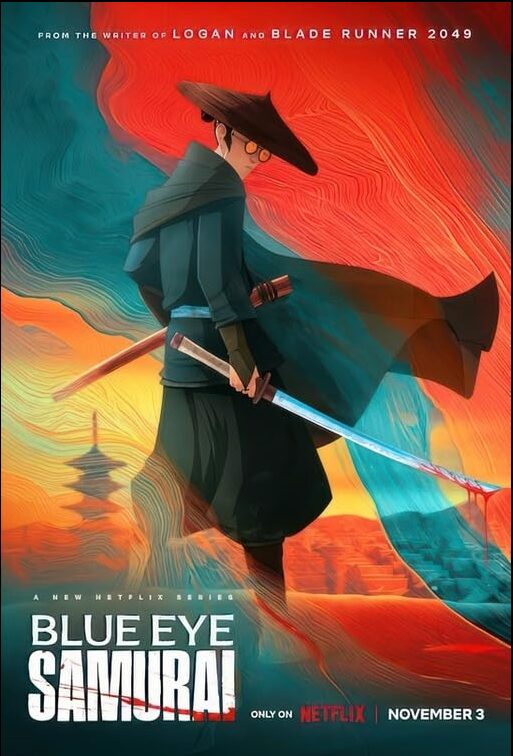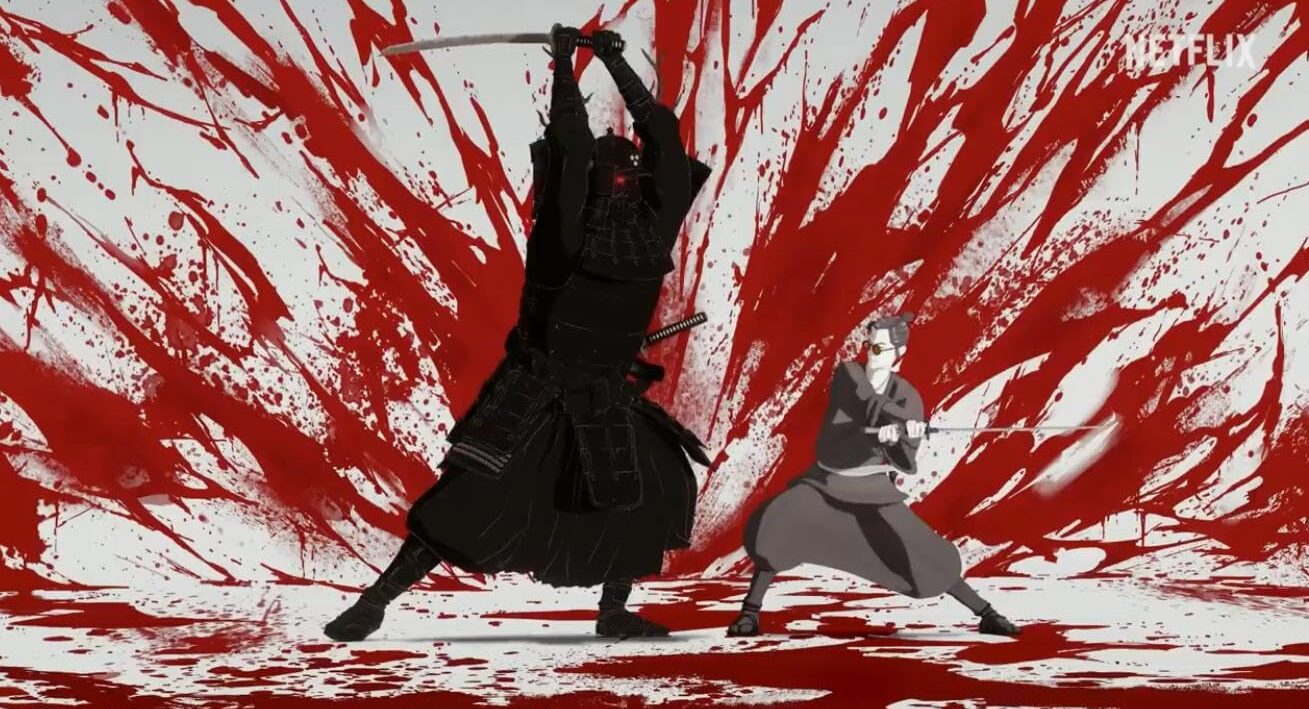**** SPOILERS AHEAD*****
Based on the internet rumblings, Blue Eye Samurai took everyone by surprise. The Netflix series has a 96% audience score on rotten tomatoes, and it is very much earned. Created by husband and wife writing team, Michael Green and Amber Noizumi (Logan, Blade Runner 2049, Murder on the Orient Express), Blue Eye Samurai is an animated quest for revenge series. The tale is set in historical 1600s Edo-era Japan during a time when the Tokugawa shogunate (the military dictatorship) has ordered the borders of the island closed to outsiders. Main character, Mizu, is a half-Japanese, half-white self-taught sword master on a journey of vengeance against the last four white men who remained in Japan when Mizu was born. Mizu believes one of them is their father who tried to kill and then abandoned them and their Mother.
Mizu’s character is hard, stubborn, seemingly unfeeling, and unyielding. Initially, it’s not clear whether we’re even supposed to like this character. One of Mizu’s first actions in the series is to defend a disabled noodle shop waiter, Oka, from the bullying and abuse of a particularly cruel patron. Then, when the handless Oka chooses to leave his life behind and follow Mizu, Mizu is needlessly cruel to and careless with him. It leaves a bad taste in your mouth. At first you want to dismiss it as the natural character of a samurai on a singular mission that can’t be bothered with outsiders, but Mizu’s attitude is ruthless and doesn’t leave room for negotiation. Eventually, Mizu accepts Oka for his resourcefulness and companionship, but Mizu’s gruffness with Oka surprisingly doesn’t get much better.

Another surprising thing about Mizu is that as a character they feel very intentionally gender queer. Mizu travels as a man. In this early era of Japanese society, women have no rights as individuals. So, appearing as a man gives Mizu the freedom to roam without limitation or permission. But more profoundly, Mizu is voiced by Maya Erskine (Pen15, Wine Country) who uses a noticeably lower vocal timbre. Erskine doesn’t quite sound like a man, but she doesn’t sound like a woman either. Mizu is physically underdeveloped in any way that would indicate femineity. Mizu binds their chest, their facial features are sharp and angular, and they lack any visual effeminate characteristics. But when we get to know more about Mizu’s past, we learn that Mizu has loved and been in a relationship with a man.
Mizu’s samurai prowess is immediately on full display when they use their sword to fight that bullying patron, slicing off his fingers while dodging bullets from the bully’s pistol. Then Mizu slices and stabs their way through an entire dojo, besting its highest regarded fighter, Taigen. This is all in episode one, so we know Mizu is a skilled master of the sword. Even with the first combat scenes in episode one, the fights are not so ridiculous that we’re led to believe Mizu is immortal or somehow infallible. Mizu takes plenty of beatings and gets near mortally wounded at some points, grounding the series when it could have gone to a hyper-fantastical place. The action sequences are brutal and bloody almost to the point of gore. The movements are quick and skillful, and the animation is sleek and pointed so that you’re able to take in every movement. The series gives you a major action scene and badass fight sequence every episode, but it never gets stale or predictable. The drama and storytelling leading up to each action scene is riveting and carries such high stakes that the fights are like an exhale and release.



A major character in the series is Japan and its people. The creators took great care and intention in building a world that seems authentic to Japanese culture of the day. The characters are modeled after bunraku puppets. Bunraku is a traditional Japanese puppet theater where life-size dolls silently act out a dramatic tale accompanied by a narrator and a Japanese lute called a samisen. A flashback episode in the series is done in bunraku style. The Blue Eye Samurai world is beautifully rendered like an enchanted portrait. Some shots that are meant to set the tone of place and time are like moving fine art. The animation is rich with textures like trees, mountains, cliffs and seas. This combined with the cinematic camerawork produces visuals that are a mesmerizing watch.
The martial arts visuals are pleasantly authentic, as well. According to co-creator Noizumu, who is a former martial artist herself, stunt choreographers were brought in to act out the fights while the animators took lessons to get a true sense of how the fight scenes should feel. The music is the cherry on top in the series. The score adds layers of emotion on top of what the storyline has already invoked in the audience and brings everything together. The music highlights the emotional beats in every scene. It darkens when Mizu comes face to face with what may be her end and lightly hops around to bring out comedic moments. When the score swells in triumph and the camera pans low to Mizu in a tired but victorious stance, you can’t help but cry out in victory as well.



There are also well-written side characters that enhance the story so that we don’t get bogged down by Mizu’s narrow focus on the mission. Almost immediately, a side plot gets heavily involved in Akemi’s story. Akemi is the daughter of Lord Daichi who has chosen to marry her off for profit and position, but Akemi is determined to take control of her own fate at almost any cost. As the series progresses, Akemi develops as almost a feminine foil to Mizu. Akemi is first and foremost a woman. Women in this era have no agency and no standing in society. They’re either a daughter, a wife, a geisha or a prostitute. While Mizu hides their female nature from the world, Akemi uses her femininity to manipulate those with authority into giving her what she wants. The series offers graphic sex scenes from both Mizu and Akemi that couldn’t be more different. Akemi uses her sexuality to get a proposal from Taigen, who she wants to marry. And when she’s face to face with the man her father actually chooses for her, she uses her sexuality, then, to force him to listen to her instead of his controlling mother. Juxtapose that with the one sex scene we get with Mizu which is loving, tender and in their own time and comfort. Watching these similar forces navigate their circumstances with completely opposing methods, but complementary skill, adds incredible depth to the series.
While there are some heavy themes, there are comedic moments and characters that push through the action, drama, and gore. The big bad throughout this first season is Abijah Fowler, a white Irishman hiding out in Japan, and the stimulus for much of the negative influences on the traditional way of life. He is dismissive of Japanese culture and traditions and is solely responsible for the introduction of guns and heavy drugs to parts of the island. His characterization is so ridiculously devious that he’s reminiscent of an unbelievably evil Disney villain. Taigen, the highly regarded samurai beaten by Mizu and the man Akemi wants to marry, is a source of comic relief as well. Once Mizu beats him, he tracks Mizu down and annoyingly demands a rematch. When Mizu refuses, Taigen takes it upon himself to follow Mizu to ensure that he gets his chance to win back his honor. An interesting relationship develops between these two characters that brings out a bit of humor in Mizu as well.


The greatest aspect of Blue Eye Samurai is how it deviates from traditional revenge plot tropes. Traditionally, the revenge seeker has an awful back story: harsh upbringing, betrayal by loved ones, the murder of those closest to them, and having everything taken from them which sends them on their quest for revenge. Mizu’s story differs in small ways. There are awful beginnings and bits of betrayal, but what makes Mizu a master samurai is not her hardness or solitude or one-track focus like traditional samurai stories. Those character flaws have made Mizu a great swordsman, but their journey always falls a bit short because Mizu is unable to trust others, to let anyone else in or to enjoy any piece of the life she’s been given. The writers seem to want Mizu to learn to trust and care about others, to open herself up to the possibility of allies and friends joining her mission and her life. Only then will Mizu fully embody what it will take to get her revenge.
Blue Eye Samurai was a rollercoaster watch. I blew through it so quickly, but I had so many emotions throughout the ride. I absolutely recommend it. You can find it streaming on Netflix.








